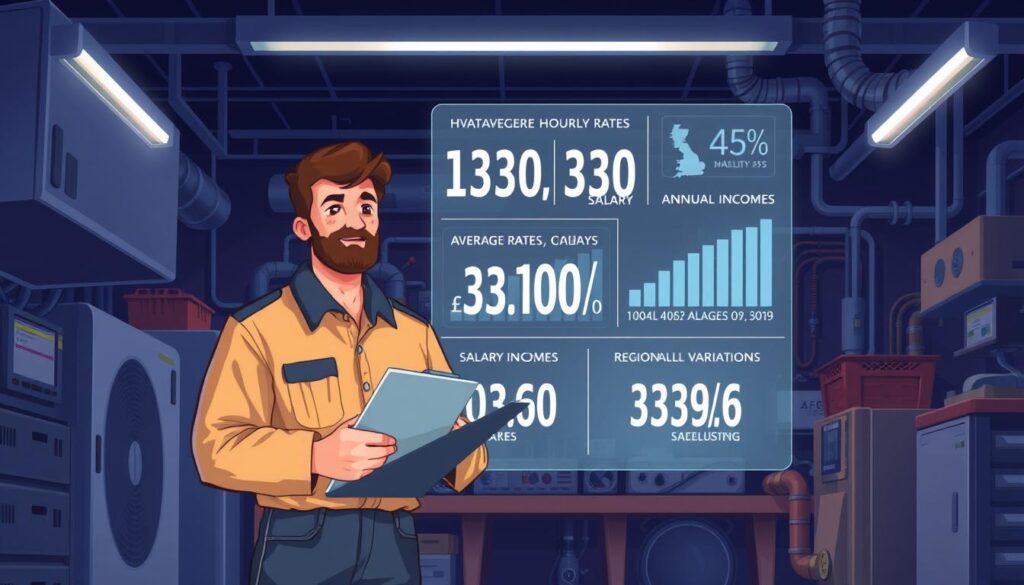Affiliate Disclosure
HVAC Guide Guys is a participant in the Amazon Services LLC Associates Program, an affiliate advertising program designed to provide a means for sites to earn advertising fees by advertising and linking to Amazon.
How Much Does a Journeyman HVAC Tech Make in the US? Ever wondered about a stable and lucrative career in the HVAC industry? Curious about what a skilled journeyman HVAC technician can earn today?

The HVAC technician salary scene is more dynamic and promising than many think. Payscale.com shows the median salary for a senior HVAC tech in the US is $77,200 a year. This works out to $37.12 an hour in 2025.
To understand a journeyman HVAC tech’s earnings, we must look at several factors. These include experience, location, specialization, and demand in the industry. This guide will give you the key insights into HVAC technician salaries. It will help you explore career paths and earning possibilities.
Key Takeaways
- Median senior HVAC tech salary reaches $77,200 annually
- Hourly rates can vary significantly based on expertise
- Location plays a critical role in determining HVAC technician salary
- Experience and certifications directly impact earning
- HVAC careers offer strong growth opportunities
Table of Contents
Understanding Journeyman HVAC Technician Salaries Nationwide
HVAC journeyman wages vary a lot across the United States. This is because of many factors that affect how much you can earn. Your income as an HVAC skilled worker depends on your experience, where you work, and any special certifications you have.
Base Salary Ranges by Experience Level
Your income as an HVAC journeyman increases with experience. Here are some salary milestones you might reach:
- Entry-level (0-2 years): $54,100 annually
- Intermediate (2-4 years): $65,700 annually
- Experienced (4-7 years): $77,200 annually
Regional Salary Variations
The place you work can greatly affect how much you earn. Some areas pay more because of high demand, living costs, and the local economy.
| Region | Average Annual Salary | Demand Level |
|---|---|---|
| Northeast | $72,500 | High |
| West Coast | $68,300 | Very High |
| Midwest | $61,200 | Medium |
| South | $57,800 | Low |
Impact of Industry Certifications
Getting professional certifications can really help your salary. EPA Section 608 Certification and NATE Certification can make you earn 10-15% more than non-certified technicians.
“Investing in professional development directly correlates with higher income in the HVAC industry.” – HVAC Professional Magazine
Explore Our HVAC Shop
Looking for top-rated HVAC tools, parts, and accessories? Visit our shop and find the perfect solution for your needs.
Visit the ShopTop-Paying States for HVAC Technicians
Some states pay HVAC technicians more than others. Your salary can change a lot based on where you work.
The best states for HVAC jobs pay a lot more than the national average. These places offer great chances for skilled technicians to grow their careers.
| State | Average Annual Salary | Key Factors |
|---|---|---|
| California | $59,200 | High cost of living, tech industry demand |
| New Jersey | $58,300 | Dense population, industrial infrastructure |
| Washington | $58,000 | Tech sector growth, climate diversity |
Your salary as an HVAC technician depends on several things:
- Local economic conditions
- Regional infrastructure development
- Climate and seasonal temperature variations
- Population density
Understanding salary differences by location is key to career planning. While high-paying states are tempting, remember to think about living costs and job competition too.
Explore Our HVAC Shop
Looking for top-rated HVAC tools, parts, and accessories? Visit our shop and find the perfect solution for your needs.
Visit the ShopCareer Progression and Salary Growth in HVAC
Your HVAC career is a journey of growth and opportunity. As you improve your skills and gain experience, your income can rise. This opens doors to exciting career paths and higher earnings.
Begin as an entry-level technician to lay the groundwork for a strong career. The journey includes several stages:
- Entry-Level Technician
- Apprentice
- Journeyman
- Senior Technician
- Supervisor/Manager
Entry-Level to Journeyman Transition
Getting from entry-level to journeyman takes dedication and learning. It usually takes 3-5 years. During this time, you’ll gain key skills and certifications that increase your value in the market.
Senior Level Opportunities
With more experience, you’ll reach senior-level positions. HVAC supervisors with 7+ years of experience can earn a median salary of $90,800. These roles require advanced technical skills and leadership abilities.
Management and Business Ownership
The most rewarding path is moving into management or starting your own business. Experienced technicians can:
- Become HVAC company managers
- Start independent contracting businesses
- Develop specialized service niches
“Your HVAC career is limited only by your ambition and willingness to learn.” – Industry Expert
| Career Stage | Typical Experience | Median Annual Earnings |
|---|---|---|
| Entry-Level | 0-2 years | $35,000 |
| Journeyman | 3-5 years | $55,000 |
| Senior Technician | 6-10 years | $75,000 |
| Supervisor/Manager | 10+ years | $90,800 |
How Much Does a Journeyman HVAC Tech Make Based on Location

Your salary as an HVAC technician can change a lot based on where you work. The location you choose is key in figuring out how much you can earn in the United States.
In cities, HVAC techs usually make more money than in rural areas. San Francisco has the highest starting salary at $64,200, with an average hourly rate of $30.87. Big cities like New York, Los Angeles, and Chicago also pay well for HVAC skills.
- Top-paying metropolitan areas for HVAC technicians:
- San Francisco: $64,200 average annual salary
- New York City: $58,500 average annual salary
- Los Angeles: $55,700 average annual salary
- Chicago: $52,300 average annual salary
In rural areas, salaries might be lower, but living costs are often lower too. Your earnings will also depend on local demand, competition, and your skills.
“Location can be a game-changer in your HVAC career earnings” – HVAC Industry Experts
Several things affect how much you can earn based on location:
- The cost of living in the area
- The local economy
- The need for HVAC services
- The number of technicians competing
- State laws on licensing
To understand your salary, look into the local job market. You might need to move for better pay.
Explore Our HVAC Shop
Looking for top-rated HVAC tools, parts, and accessories? Visit our shop and find the perfect solution for your needs.
Visit the ShopBenefits and Compensation Packages
When looking at hvac journeyman wages, it’s key to see the whole picture. Benefits go beyond just a paycheck. HVAC companies know that great benefits are key to keeping top talent.
Comprehensive Health Insurance Options
Health insurance is a big part of what HVAC companies offer. They provide plans that cover a lot:
- Medical plan with low deductibles
- Dental coverage
- Vision care benefits
- Prescription drug coverage
Retirement and Financial Planning
Good HVAC companies think about their technicians’ future. They offer plans to help with retirement:
- 401(k) matching programs
- Profit-sharing opportunities
- Investment advisory services
Performance Bonuses and Incentives
Many employers use bonuses to motivate their technicians. This can include:
| Bonus Type | Potential Earnings |
|---|---|
| Customer Satisfaction Bonus | $500-$1,500 annually |
| Productivity Incentives | 5-10% of base salary |
| Referral Bonuses | $250-$750 per successful hire |
Additional Professional Perks
Top HVAC companies also offer special perks. These can include:
- Continuing education reimbursement
- Company vehicle or mileage compensation
- Advanced training opportunities
- Flexible scheduling options
Great benefits are key to attracting and keeping the best HVAC talent. They’re a big part of career growth.
Urban vs Rural Salary Differences

When looking at hvac journeyman income, where you work matters a lot. Urban and rural HVAC techs earn differently because of several important factors.
Heating and cooling tech pay varies a lot between cities and rural areas. Big cities usually pay more because they need more techs and have complex systems. Rural areas might pay less at first, but they have their own money perks.
- Urban HVAC techs get:
- More money per hour
- More job chances
- Chances to work on cool tech projects
- Rural HVAC techs get:
- Lower living costs
- Less competition
- Stronger ties with the community
The salary picture shows some fine details. While cities might pay $65,000 to $85,000 a year, rural areas can offer similar take-home pay. This is because living costs are lower there.
| Location Type | Average Salary | Cost of Living Impact |
|---|---|---|
| Urban Areas | $75,000 | High expenses reduce net income |
| Rural Areas | $60,000 | Lower expenses increase purchasing power |
When planning your career, think about more than just the salary. Look at the whole financial scene of your chosen place.
Explore Our HVAC Shop
Looking for top-rated HVAC tools, parts, and accessories? Visit our shop and find the perfect solution for your needs.
Visit the ShopFactors Affecting HVAC Technician Earnings
Your earnings as an HVAC technician depend on several key factors. These factors can greatly affect your career and how much you can earn. Knowing these elements helps you plan your career in the HVAC field.
The HVAC industry offers many chances for skilled workers to earn more. By making smart career choices, you can increase your income.
Specialization Impact on Earnings
Choosing a specific area in HVAC can really boost your pay. Technicians with special skills in certain areas often get paid more.
- Commercial HVAC systems
- Advanced refrigeration technologies
- Industrial process cooling
- Green energy HVAC solutions
Education and Certification Requirements
Your education and certifications are very important for your earnings. Getting advanced qualifications can lead to higher pay.
| Certification Level | Potential Salary Increase |
|---|---|
| EPA Section 608 Certification | 5-10% salary boost |
| NATE Certification | 10-15% salary increase |
| Advanced Specialty Certifications | 15-25% earnings growth |
Years of Experience
Experience is a big factor in your earnings. As you move from beginner to journeyman and master technician, your pay goes up a lot.
- Entry-level (0-2 years): Base compensation
- Mid-career (3-7 years): Significant salary growth
- Experienced (8+ years): Premium earning
To earn more in the HVAC industry, plan your career well. Keep learning and focus on specific areas. This will help you reach your earning goals.
Commercial vs Residential HVAC Salary Comparison
When looking at hvac technician salaries, it’s key to know the difference between commercial and residential work. Commercial HVAC techs usually make more because their jobs are more complex and require special skills.
Your earnings in the hvac field can change a lot based on where you work. Commercial HVAC needs advanced skills and certifications. This means better pay for those who specialize in it.
| HVAC Sector | Average Annual Salary | Skill Complexity |
|---|---|---|
| Residential HVAC | $52,000 – $65,000 | Moderate |
| Commercial HVAC | $65,000 – $85,000 | High |
There are big differences between commercial and residential HVAC jobs:
- System complexity
- Required technical expertise
- Certification levels
- Work environment diversity
Commercial HVAC techs handle big, complex systems in places like offices, hospitals, and factories. These jobs need a lot of technical knowledge and special training. This affects how much they can earn.
Residential HVAC work is more regular and predictable. But, commercial HVAC offers higher salaries and chances for career growth. Choose based on your goals and skills.
Explore Our HVAC Shop
Looking for top-rated HVAC tools, parts, and accessories? Visit our shop and find the perfect solution for your needs.
Visit the ShopIndustry Growth and Future Salary Projections
The HVAC industry is on the verge of big changes, opening up new chances for journeyman HVAC pros. The Bureau of Labor Statistics says there will be 40,100 new jobs by 2033. This growth means better pay for HVAC journeyman wages and professional compensation.
New technologies are changing HVAC careers. New areas like green energy and smart homes are creating more job options. This means more chances to earn more.
- Green energy systems
- Smart home integration
- Energy-efficient climate control
- Advanced refrigeration technologies
The future for HVAC pay looks good. Skills in new tech will lead to higher salaries. By keeping up with new systems, you can earn more.
“The most successful HVAC professionals will be those who embrace technological innovation and ongoing education.” – Industry Expert
Salaries are expected to rise, with experienced workers earning more. By focusing on learning new skills, you can increase your earnings in this fast-changing field.
Conclusion
The HVAC industry is full of chances for skilled technicians looking for stable jobs. Knowing how much a journeyman HVAC tech can make shows a bright future. Your career path depends on many things, like what you specialize in, where you work, and how much you learn.
Exploring the HVAC technician salary range, remember that smart choices can really boost your income. Senior HVAC pros make up to $77,200 a year, showing the value of hard work and skills. By getting advanced certifications, working in high-demand areas, and learning special skills, you can grow your career a lot.
Your success in HVAC depends on being flexible and always learning. Starting jobs may not pay much, but experienced technicians can earn a lot in different areas. Keeping your skills sharp, networking, and staying up-to-date with new tech are key to earning more and being happy at work.
Being an HVAC technician is more than just good pay. It’s a stable job with many ways to move up, from working in the field to managing or even owning your own business. Your dedication to doing great work will help turn your technical skills into a rewarding career.

